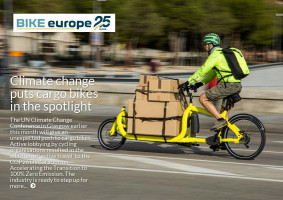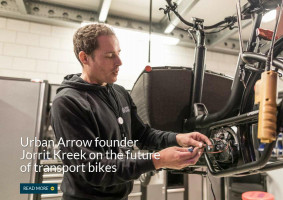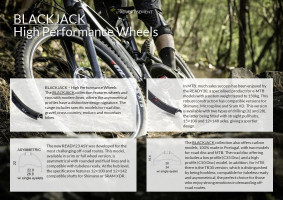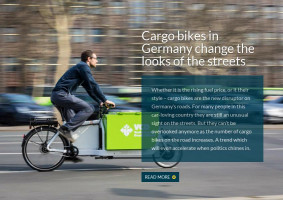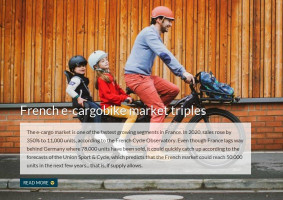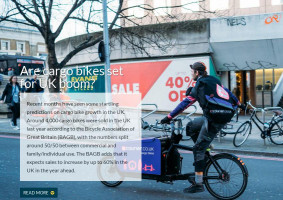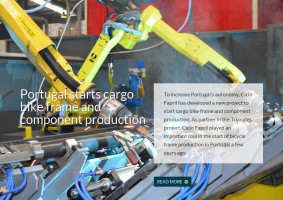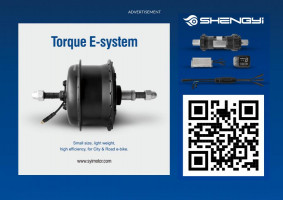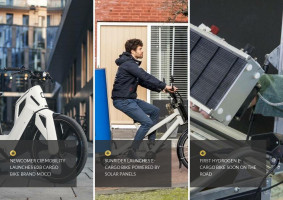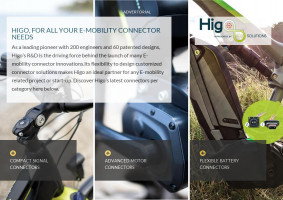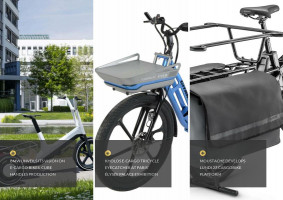Whether it is the rising fuel price, or it their style – cargo bikes are the new disruptor on Germany’s roads. For many people in this car-loving country they are still an unusual sight on the streets. But they can’t be overlooked anymore as the number of cargo bikes on the road increases. A trend which will even accelerate when politics chimes in.
READ MORE
Small things matter, one could often say. It is certainly the case for cargo bikes. As relatively small vehicles they can easily replace a much bigger car when it comes to deliveries for the famous last mile. Or the weekly shopping for the family. Indeed the sales numbers in Germany are as overwhelming as all over Europe.
The national industry association Zweirad-Industrie-Verband collected the sales data and came up with a total market volume of more than 100,000 units sold last year. That would be a plus of 36% in comparison to the previous year. And for 2021 the industry forecasts a growth again despite supply chain constraints and components shortages which are hampering the industry. The trend is well embedded in Europe. “We expect the European market to expand by 40 to 50% over the last year,” says Jorrit Kreek, co-founder and director of Dutch-based manufacturer Urban Arrow.
Emerging market, brings in new players
In a nutshell: bikes as well as cargo bikes are sought after these days in Germany. No wonder demand gave opportunities for new players. Muli for example, a Hamburg based brand which was founded by two brothers in 2015. They came up with a simple idea for a new kind of bike: a very compact cargo bike boasting a foldable basket as some sort of trunk. The start of the business for the two brothers was made possible through a kickstarter campaign in 2017.
A rather similar story is Yoonit, another Hamburg-based producer. Their product range? Only one type of cargo bike, but with three options for carrying a load. They offer a plain platform, a basket and an open box. “The company has been founded under the roof of uuio GmbH, explicitly created in 2016 as a sort of hub for creative ideas and start-ups,” says Johann Cohrs who founded the company together with Sebastian Kühnel and Niels Römer. “Initially we financed the company from our own resources but we now are in the position to receive funds from different sources,” says Cohrs.
Other smaller manufacturers on the cargo bike market have a longer heritage. Michael Kemper for example founded his company Kemper Fahrradtechnik in North Rhine-Westphalia already in 1988 with tailormade bikes for long distance travelling. As early as 1992 he added the first cargo bikes to his portfolio. How was demand in Germany fulfilled at that time? “Deliveries came from the Netherlands,” says Michael Kemper.
Concept-wise the sky is the limit at the moment. Carlo Cargo from Kenzingen in the south of Germany came up with the idea of an electrically supported trailer.
Political powerplay on the horizon?
The reasons? Perhaps “the large manufacturers were not assured that this product would be successful enough in terms of volume,” says Michael Kemper. But now they are.
Compared with these innovators, some of Germany’s leading players on the e-bike and bicycle market have made a very late start. The reason? “Perhaps the regular bicycle manufacturers were not confident about future expectations of cargo bikes when looking at the market”, says Michael Kemper. But this situation has changed and many of them stepped in with product introductions.
For example, Bergamont started only last year with a cargo bike line, the E-Cargoville. Even the automotive industry tries to benefit from the trend and presented some concepts in the past years. According to German media reports, Volkswagen will take its first cargo bike into production this year. The concept of this eBike Cargo3 was launched back in 2018.
_w1700_h832_1.jpg)
The next step in mobility is here
Well-known bike brand Canyon came up with the idea of the Future Mobility Concept, an e-bike with four wheels and a proper coachwork to protect driver and load from the rain. It was presented as an alternative to a car and bike. According to Canyon it includes a new approach and a decisive step towards freeing up more space on our roads for bicycle technology. “It combines the advantages of a car and an e-bike in one, making it the ultimate vehicle for the daily commute. It's fast and stable enough for road traffic, yet light and maneuverable enough for the bike path when you want to pass the next traffic jam.”
Political landscape changed
In the near future Germany’s cargo bike producers might experience additional tailwind in the form of subsidies. So far the landscape of financial support for this category is very fragmented; some local authorities help with purchasing cargo bikes, others not. But as the German elections took place this autumn and drove Angela Merkel’s leading CDU-party out of office, especially the Greens, the social-democratic party (SPD), as well as the liberals (FDP) are the new parties to count on. One of these three parties has been openly advocating a nationwide subsidy for cargo bikes. The Green party already proposed a €1,000 subsidy on every cargo bike. And there are signs that the SPD, winner of the elections, seems to have begun whistling the same tune.
What about the cargo bike producers themselves? “A nationwide promotion for this means of transport would be a long-expected signal from the government to the industry”, says Yoonit-co-founder Cohrs. “Low-emission mobility should be supported at all levels.” People and producers seem to have got the message. Whether the politicians in Germany do take the necessary action, will be proven shortly.”
Photo: Lastenrad VCD
